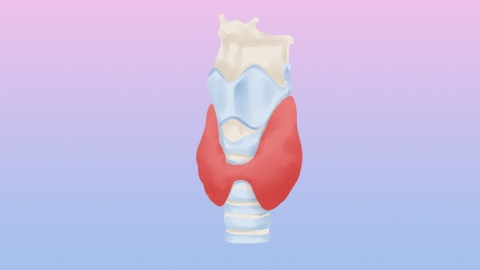What are the main symptoms of abnormal thyroid function?
Generally, abnormal thyroid function refers to pathological conditions caused by either hyperthyroidism (overactive thyroid) or hypothyroidism (underactive thyroid). Symptoms of hyperthyroidism include increased metabolism, nervous system excitation, cardiovascular abnormalities, gastrointestinal disturbances, and ocular changes. Symptoms of hypothyroidism include reduced metabolic rate, skin changes, musculoskeletal discomfort, endocrine disturbances, and voice changes. If experiencing any discomfort, it is recommended to seek timely medical treatment. A detailed explanation is as follows:

I. Symptoms of Hyperthyroidism
1. Increased Metabolism
Thyroid hormones promote oxidation-reduction reactions in the body and elevate the basal metabolic rate, leading to increased physical consumption. Patients commonly experience excessive sweating, even while at rest. Despite an increased appetite, patients may lose weight because the body's consumption rate is too fast, accelerating the breakdown of fats and proteins, resulting in weight loss despite increased food intake.
2. Nervous System Excitation
Thyroid hormones act on the nervous system, increasing the excitability of nerve cells and causing excessive responses to stimuli. Patients may become easily agitated, restless, and experience significant mood swings. Insomnia may also occur, as excessive thyroid hormone keeps the brain in a continuous state of excitement, disrupting normal sleep patterns and making it difficult to achieve deep sleep.
3. Cardiovascular Abnormalities
Thyroid hormones enhance myocardial contractility and accelerate heart rate. Patients often experience palpitations, with a sensation of rapid or pounding heartbeat. Prolonged hyperthyroidism increases the heart's workload and may lead to arrhythmias such as premature beats or atrial fibrillation, affecting normal cardiac rhythm.
4. Gastrointestinal Disturbances
Thyroid hormones accelerate gastrointestinal motility, speeding up gastric and intestinal emptying. Patients may experience increased frequency of bowel movements, sometimes several times daily, with loose or unformed stools. Additionally, gastrointestinal digestion and absorption functions may be affected, so although appetite is increased, some nutrients may be excreted before being fully absorbed.
5. Ocular Changes
Some patients may develop exophthalmos (bulging eyes), which can be categorized as non-inflammatory (simple) exophthalmos or inflammatory (infiltrative) exophthalmos. Simple exophthalmos results from sympathetic nerve stimulation, increasing the tension of the extraocular muscles and the levator palpebrae superioris muscle. Infiltrative exophthalmos is associated with autoimmune reactions, where excessive glycosaminoglycans secreted by orbital fibroblasts accumulate, causing edema and enlargement of orbital tissues, leading to protrusion of the eyeballs. Severe cases may affect vision, causing symptoms such as double vision and vision loss.
II. Symptoms of Hypothyroidism
1. Decreased Metabolic Rate
Thyroid hormones promote metabolism. When thyroid function is reduced and thyroid hormone secretion is insufficient, the body's metabolic rate slows, heat production decreases, and patients often feel cold, even at normal ambient temperatures. Body temperature may also be slightly lower than normal.
2. Skin Changes
Thyroid hormones regulate skin metabolism. In hypothyroidism, skin metabolism slows, leading to water retention in the stratum corneum and accumulation of mucoproteins in the subcutaneous tissue. This causes dry, rough skin, which may also be accompanied by scaling. Due to slowed circulation, the skin may appear waxy-yellow and lack luster.
3. Musculoskeletal Discomfort
Thyroid hormone deficiency affects normal muscle metabolism and function. Patients may experience slowed muscle contraction and relaxation, often feeling muscular weakness, aching, and reduced exercise tolerance. Mucoprotein deposition within joint cavities may cause joint pain, stiffness, and discomfort during movement, which in severe cases can affect joint mobility.
4. Endocrine Disturbances
In female patients, abnormal thyroid hormone levels can affect the hypothalamic-pituitary-ovarian axis, causing excessive endometrial proliferation, leading to heavy menstrual bleeding, prolonged menstruation, and irregular menstrual cycles. Long-term hypothyroidism may also affect ovulation, potentially causing infertility.
5. Voice Changes
Mucinous edema of the vocal cords and laryngeal tissues causes thickening and relaxation of the vocal cords, impairing sound transmission and resonance. The patient's voice becomes deep and hoarse, and speaking may feel effortful with unclear articulation.
In daily life, maintaining a balanced diet, appropriately consuming iodine-containing foods, and avoiding excessive or insufficient iodine intake are important. It is also essential to maintain regular sleep patterns, avoid long-term sleep deprivation and excessive fatigue, and uphold healthy lifestyle habits to maintain endocrine system stability.









